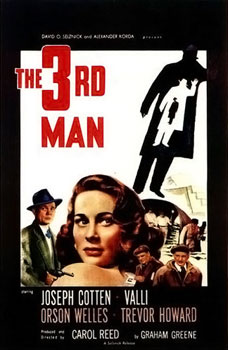
GFS home movies: The Third Man
 Due largely in part to a recent tweet from Roger Ebert, I decided to check out The Third Man recently. It’s apparently considered to be pretty good, as evidenced by its inclusion on AFI’s original list of the 100 best American movies of all-time (it was at #57, but was cut from the most recent list). I also wanted to check it out because I haven’t really taken the time to explore film noir as much as I’d like, and also I figured it had to be good since it had pre-puffy Orson Welles.
Due largely in part to a recent tweet from Roger Ebert, I decided to check out The Third Man recently. It’s apparently considered to be pretty good, as evidenced by its inclusion on AFI’s original list of the 100 best American movies of all-time (it was at #57, but was cut from the most recent list). I also wanted to check it out because I haven’t really taken the time to explore film noir as much as I’d like, and also I figured it had to be good since it had pre-puffy Orson Welles.
Score one for social networking, because it definitely is an enjoyable film and has held up fairly well since it was released in 1949.
So what’s it all about? The film takes place in post-World War II Vienna, a defeated city divided into four occupied zones (American, British, French, and Russian), as well as an international zone. The local economy is in tatters, and the black market is flourishing. Anything and everything that can be sold illegally is.
Into this world steps American novelist Holly Martins (Joseph Cotten), who comes with a promise of employment with his friend Harry Lime (Welles). Only problem is Lime is dead, struck down by an automobile that week. Martins, who writes popular Westerns in the style of Zane Grey, attends Lime’s funeral and is noticed by the British Royal Military Police, led by Major Calloway (Trevor Howard). Calloway reveals a rather unpleasant fact about Lime – that he was involved in the black market – which sets Martins off. He vows to prove Calloway wrong and seeks out people who knew Lime, in the hopes of clearing his good friend’s name.
As Martins talks to more of Lime’s associates he grows increasingly suspicious, and sets out to investigate the circumstances surrounding his old friend’s death. One of these circumstances concerns the men who helped Lime in his last moments – Baron Kurtz (Ernst Deutsch) and man named Popescu (Siegfried Breuer). What they fail to mention is the presence of a mysterious third man, who turns out to be the key to the whole story.
Martins makes the acquaintance of Lime’s girlfriend, Anna Schmidt (Alida Valli), who reluctantly helps Martins in his quest for the truth. Whether or not they can handle said truth remains to be seen…
The pacing in The Third Man is a little slow by today’s standards, at least for movies with aspirations to make lots of money. This is the kind of film George Clooney would produce when he’s not working on his more commercial, Ocean’s Eleven-type movies. So I had to remind myself to just relax and let things flow on a few occasions. One of the biggest was the final shot (which I won’t spoil here), which unfolds over the course of a few minutes and contains no dialogue and pretty much no action. But it’s totally worth it.
The story, which I’ve already touched on, is a fairly tight one and definitely held my interest. One thing I like about films of this type is the willingness to revel in cynicism and reality, at the expense of fake, feel-good moments. This also comes up in the final scene, which was in stark contrast to the one originally penned by screenwriter Graham Greene. This movie pulls no punches and gives us a real peek at humanity’s dark side, mostly through the Lime character. Most famous is a scene between Lime and Martins, where Lime compares the public at large to a bunch of dots, representing not human life but potential profit. It’s also known as the “cuckoo clock speech”, and you can check it out here before YouTube yanks it:
But before the first line of dialogue is spoken, I was struck by The Third Man‘s distinctive soundtrack. The entire movie is composed and scored by Anton Karas, who played the whole thing with the zither. It was a bold choice by director Carol Reed, who wisely avoided the easy route of using orchestrated waltzes to represent post-war Austria. It gives the movie a certain extra flavor, and is quite effective in spots. Check out the opening credits:
Believe it or not, “The Third Man Theme” by Karas spent eleven weeks at number one on Billboard’s U.S. Best Sellers in Stores chart in 1950.
But beyond the score, story, and dialogue (all of which are good), The Third Man boasts some excellent cinematography and direction. While it may not fit all the standard criteria of film noir, this movie had moody, well-lit shots in spades. Here’s just a few:
So if you’re a film buff or even if you just like a good story, I highly recommend The Third Man.